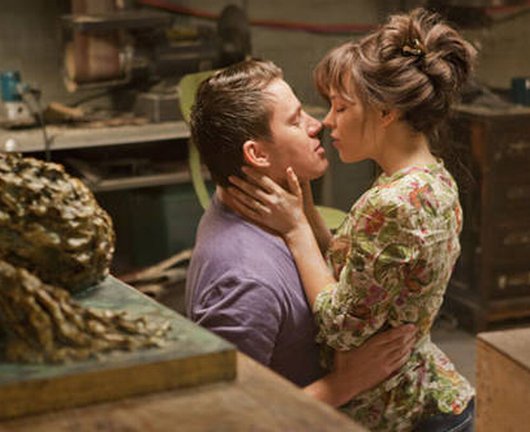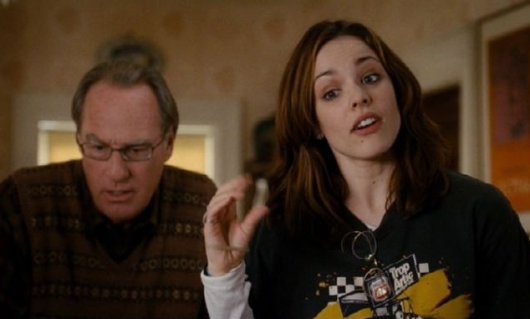 FILM
FILM In Which We Are Simply A Natural At This
 Friday, February 24, 2012 at 10:14AM
Friday, February 24, 2012 at 10:14AM 
Piece of Cake
by DURGA CHEW-BOSE
Rachel McAdams has Olympic caliber poise. Somewhat jelled, her smile is red-lettered, her jaw, prominent, and her body, sprightly. It's as if she just landed a double axel or performed a clean dismount from the balance beam, no sweat. In romantic roles her male co-stars regularly lift her, carry her, or nimbly swing her, but I suspect it’s McAdams who supplies any, if not all, cantilevered grace.
What lends most to screen is her strikingly nostalgic features. Owing perhaps to the alien twinkle in her eyes, her dimples, or her downy skin, McAdams appears especially saturated on celluloid; especially Sirk. Like Jane Wyman she is puckish and beautiful, and at times lost in thought. Both women look buffed — a near satin sheen. Both women have incredibly expressive foreheads.

In The Vow she plays Paige, a woman who after emerging from a car accident induced coma, suffers from amnesia. She cannot remember the last four years of her life which include an artsy, permissive turn — sculpting, air-dried hair, loft living — and more importantly includes her marriage to Leo played by Channing Tatum. As a result she wakes confused and returns to her old life: estranged parents, law school, quotidian suburban customs, blueberry mojitos, a sister’s wedding, sweater sets, and Scott Speedman. Unfortunately, not much happens. Despite the potential for something far creepier, sadder, syrupy and even peculiar, the film bops from scene to scene as if dispirited and mooney, much like Tatum-speak and Tatum-mien.
Ironically, it’s McAdams’ performance as a character whose life has been erased, that provides the most vitality. She has filmic gumption and a bounty of grins and laughs that rescue stale moments. (Julia Roberts and Sandra Bullock pioneered that particular bail out; McAdams and Anne Hathaway have revived it). Moreover, Paige has whims. She resists but ultimately surrenders to tickling, she feeds a stray cat, she buries herself in an oversized sweatshirt, and offers plump strawberries to Leo’s friends at breakfast. Her wedding dress was pink and her vows were written on a coffee shop menu.
Regardless of these parts, Leo and Paige’s love story plays out like a music video. Or the music video for a song on The Vow’s original soundtrack. Or something Josh Hartnett may have done in 2004. In many ways, its finest function is as a catalog of required proportions: McAdams’ hands are the size of Tatum’s neck and when he scoops her up, she screeches. He is shirtless for nearly forty percent of the film. She wears a classic rotation of outfits: pajamas (his), pajamas (hers), formal wedding attire, messy studio clothes, lace underwear. She has a six-to-one, charismatic to gross, ratio of habits. Even so, they are never that gross.

The camera loves McAdams. It is her moon. Tina Fey admits learning from her throughout Mean Girls. "That was the first movie that I had ever been on. And I would watch – I would stand with the director sometimes and watch her scenes. And I would say to the director: Like, that’s really small. Is she doing it? And then watching her on film, watching the dailies, I’m like: Oh, yes, she’s amazing. She’s a film actor. She’s not pushing. And so I kind of learned that lesson from watching her…"
What Fey recalls, those "small", minor mannerisms are McAdams’ register of finely controlled facial muscles. She can call upon each one as if summoning an invisible series of nylon strings secured to her cheekbones, chin, temples, ears. The slightest twitch or eye roll, easy! The faintest pout or cartoonish gaze, done! A toothy hee-haw, no problem! A single, bulging vein, why not! She is a natural. She knows when to elongate her neck, how to scurry in heels, how far to dip back when laughing, how to kiss passionately and dispassionately, and how to eat cake as if it were more satisfying than the man sharing the slice with her.

McAdams’ performances are truly athletic. And unlike Keira Knightley or Scarlett Johansson, whose acting we often watch as curious spectators, (anthropological!), too far removed from their traits to relate, wondering perhaps how they will pull it off, McAdams, we simply cheer.

There’s a moment near the end of The Family Stone, where McAdams — who plays Amy, the cranky and defensive, but ultimately very loving "mean sister" — is sitting in an ambulance on Christmas day with the guy who "popped her cherry” years ago. His name is Brad Stevenson (Paul Schneider). He is shy, mumbles and has a slight swallow. He’s an EMT who wrapped her present in a clock radio box. "Don’t worry, it’s not a clock radio." She’s gruff and impatient but appreciates the gesture, and perhaps even him, once more. Inside the box is a snow globe that McAdams cups in her hands as if it were hidden treasure. As if she was a child. As if she might, in that moment, be living inside the stillness of a snow globe. She smiles and quietly exclaims, "Wow, Brad.” The scene is interrupted by yet another madcap Stone family moment, but the peaceful way Amy appreciates Brad, the way McAdams says "Wow" as if it were her first word, chimes until the end of the film
As Diane Keaton, who starred with McAdams in both The Family Stone and Morning Glory, remarked, "She's like a violin. She can do anything, and she can play anything. She's a dynamo, but she's also soft. She can be bitchy but also light. She can do serious drama; she can do comedy. She has a lot of things going on, which makes her absolutely captivating.”

At the 2005 MTV Movie Awards, McAdams and Gosling won the award for Best Kiss. She in a bustier and jeans and he chewing gum and wearing a white Darfur t-shirt, the then couple reenacted their Notebook kiss as Maroon 5’s "She Will be Loved” played. The crowd went crazy, Lindsay Lohan screamed "Oh my God!” and Hillary Duff giggled with her sister. The entire two minutes are a pop culture capsule and emphasize McAdams’ irrefutable appeal. As she walks off the stage with Gosling, who picks up her blazer and coolly throws it over his shoulder, McAdams looks flush, a little embarrassed, but triumphant with her Golden Popcorn, silly sure, nevertheless, a medal.
Durga Chew-Bose is the senior editor of This Recording. She is a writer living in Brooklyn. She last wrote in these pages about Kenneth Lonergan's Margaret She tumbls here and twitters here. You can find an archive of her writing on This Recording here.

"Mad Mad Me" - Bonnie Prince Billy & Mariee Sioux (mp3)
"Bird Child" - Bonnie Prince Billy & Mariee Sioux (mp3)
"Loveskulls" - Bonnie Prince Billy & Mariee Sioux (mp3)






























